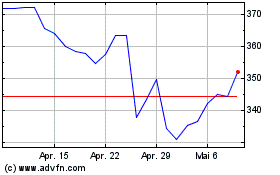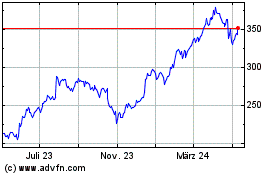By Michael Wursthorn
Growing tensions between the U.S. and China exacerbated
investors' fears of an all-out trade war between the world's
largest economies, shaving more than 550 points off the Dow Jones
Industrial Average on Friday as investors braced for more
turbulence ahead.
All 11 major sectors of the S&P 500 index declined, as
investors broadly sold stocks, with the deepest declines among big
industrial manufacturers like Boeing Co. and Caterpillar Inc. that
stand to suffer from an escalation in protectionist trade
policies.
Friday's session marked the S&P 500's ninth 1% swing up or
down in the past 11 trading days, a sign of stocks' uneasy footing
and resurgent volatility.
Investors were already grappling with concerns that technology
stocks won't be able to generate the massive gains of previous
years and the threat of inflation rising more quickly than
expected. Those fears were alleviated Friday when new data showed a
steady rise in wages last month.
But the issue of trade and how far the Trump administration is
willing to go with its protectionist agenda has become a driving
force behind the stock market's gyrations for more than a
month.
Those concerns deepened Friday after Chinese Commerce Ministry
spokesman Gao Feng acknowledged the two governments were now in a
battle and described President Donald Trump's consideration of
penalties on an additional $100 billion in Chinese goods as
"extremely wrong."
Investors worry the tit-for-tat responses between the U.S. and
China could translate into more severe and farther-reaching
sanctions that pressure American companies and raise prices for
consumers.
Investors say an escalation could crimp the global economic
growth engine that has acted as a key pillar for the latest leg of
the stock-market rally.
Several Trump administration officials, including Larry Kudlow,
head of the White House National Economic Council, Treasury
Secretary Steven Mnuchin and White House press secretary Sarah
Huckabee Sanders, tried to allay investors' concerns of a trade
conflict to little avail.
Mr. Mnuchin, speaking on CNBC, said it would take time for the
announced and potential U.S. tariffs to take effect, and meanwhile,
"we'll continue to have discussions. But there is the potential of
a trade war."
That last comment appeared to send the market sliding. The Dow
fell as much as 767 points in the late afternoon before paring its
decline to 572.46 points, or 2.3%, to 23932.76.
Ms. Sanders, meanwhile, said later Friday that, "this is
something that China has created and President Trump is trying to
fix it."
Federal Reserve Chairman Jerome Powell, who reiterated the
central bank's intent to proceed with a slow, steady path of rising
interest rates, added Friday that "tariffs can push up prices," but
went on to say that it is too early to predict what would be the
full economic impact of a trade war with China.
The growing uncertainty over a trade war and what that means for
businesses across the country prompted the stock market's most
nervous investors to sell Friday, said Kenny Polcari, managing
director at broker-dealer O'Neil Securities.
"It could get uglier over the weekend, and some are getting out
because it could go either way," said Mr. Polcari, who added that
trading volumes were light, suggesting the selling is being driven
more by smaller traders and investors rather than big money
managers. "If [the administration] calms the rhetoric down over the
weekend, then you'll likely see the market rally right back
Monday."
The S&P 500 declined 58.37 points, or 2.2%, to 2604.47,
while the Nasdaq Composite slid 161.44 points, or 2.3%, to 6915.11.
For the week, the Dow dropped 0.7%, the S&P 500 fell 1.4% and
the Nasdaq declined 2.1%. The S&P 500 is now off 2.6% for the
year and down 9.3% from its late January peak.
Investors moved into assets that tend to hold up better during
times of uncertainty, with so-called haven assets such as bonds and
gold rising. "There's genuine fear that this thing with China is
not going to go well, " said Jeff Lancaster, a principal of Bingham
Osborn & Scarborough, an advisory firm that manages $4.2
billion.
Shares of Boeing, which has been cited as a bellwether by
analysts to gauge investors' reaction to trade-sensitive stocks,
fell 3.1%. Heavy machinery manufacturers Caterpillar and Deere
& Co. dropped 3.5% and 3.9%.
Financial firms also weighed heavily on major indexes after
those stocks were hurt by stronger bond prices, which rose after
the latest trade salvos. Higher bond prices and lower yields tend
to narrow the gap between short- and long-dated Treasury notes and
crimp lenders' profits.
Shares of Goldman Sachs Group fell 2.3%, while the KBW Nasdaq
Bank Index of large U.S. lenders slid 2.7%.
The yield on the benchmark 10-year U.S. Treasury note fell to
2.779% from 2.830% on Thursday. Yields move inversely to
prices.
Meanwhile, the latest jobs report showed that wages grew as
expected from a year earlier, with average hourly earnings rising
2.7% in March. That eased worries among some investors that
inflation had been growing faster than expected this year and that
the Fed would have to hasten its pace of interest-rate hikes to
keep the economy from overheating.
"This should help moderate investors' expectations for the
[Federal Reserve] getting ahead of itself," said Doug Coté, Voya
Investment Management's chief market strategist.
Write to Michael Wursthorn at Michael.Wursthorn@wsj.com
(END) Dow Jones Newswires
April 06, 2018 19:25 ET (23:25 GMT)
Copyright (c) 2018 Dow Jones & Company, Inc.
Caterpillar (NYSE:CAT)
Historical Stock Chart
Von Jun 2024 bis Jul 2024

Caterpillar (NYSE:CAT)
Historical Stock Chart
Von Jul 2023 bis Jul 2024
